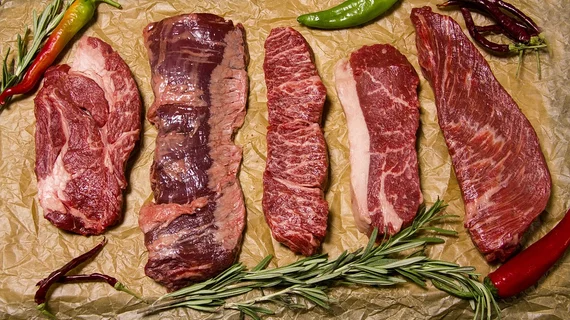Another red meat study says heart health, death risks rise with consumption
Meat lovers beware: a new study gives a forkful of warnings about meat consumption and the associated risks of heart disease and death. The findings, published in JAMA Internal Medicine, showed small risk increases for heart disease and death with just a couple servings of certain types of meat per week.
The study comes at a time when conflicting studies about red meat consumption have come to light. Last year, a guideline published in the Annals of Internal Medicine said cutting back on red and processed meat actually won’t have much of an impact on your health, and previous studies finding health risks were actually flawed. The study was immediately met with backlash from industry experts. However, just a few months later at the beginning of 2020, the publication issued a correction to the study, noting one of the authors omitted ties to meat industry funding in other studies.
Researchers in the latest study again wanted to know if consuming processed meat, unprocessed red meat, poultry or fish was associated with cardiovascular disease and death. While the association of processed meat intake and heart disease and death is known, researchers went further to explore the impact of unprocessed red meat, poultry or fish on health.
The researchers analyzed data from six prospective cohort studies in the U.S. of nearly 30,000 adult participants, where their baseline diet data was collected from 1985 to 2002. The participants didn’t have heart disease at the point of baseline data, with a self-reported daily caloric intake between 500 and 6,000 kcal. They were followed up through August 31, 2016.
Participants consumed a median of 1.5 servings of processed meat per week, 3 servings of red meat, 2 servings of poultry and 1.6 servings of fish. Those who ate the most meat––across all types––were more likely to be male, non-Hispanic black and current smokers. They were also more likely to have diabetes, a higher body mass index, higher cholesterol, lower diet quality and higher rates of cardiovascular disease and death.
Among the study participants, consuming processed or red meat, but not poultry or fish, was significantly associated with higher risk of death. Consuming high amounts of processed meat, red meat or poultry, but not fish, was associated with a higher risk of cardiovascular disease. Fish was not associated with a higher risk for heart disease or death in the study.
However, the risks weren’t enormous.
“The effect sizes of these association estimates were small,” wrote first author Victor Zhong, PhD, from Cornell University and Northwestern University Feinberg School of Medicine, and Northwestern colleagues.
Two servings of red meat, processed meat or poultry on a weekly basis had a 3% to 7% higher risk of heart disease. Two servings of red or processed meat, but not fish or poultry, was associated with a 3% higher death risk. Two servings of poultry per week increased heart disease risks by 4%.
Researchers did note they were limited by not knowing how food was prepared, such as if it was fried or not.

